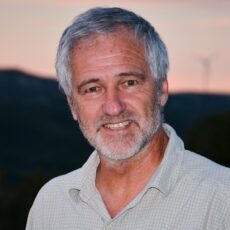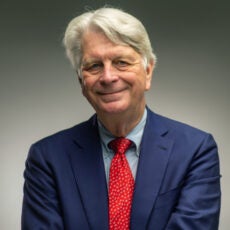Watch the event.
2023 Carnot Prize Policy Lecture and Award Ceremony
Event Summary
This year marks our eighth annual Carnot Prize for distinguished contributions to energy policy—and our 2023 recipient is Ramón Méndez Galain, physicist, renewable energy visionary, and former energy director of Uruguay.
During his tenure, Méndez transitioned the country away from fossil fuels and toward a diverse mix of wind, solar, hydro, and other forms of clean energy. Because of his plan, almost all of Uruguay’s electricity today is generated with renewable energy. Uruguay is one of the most electrified countries in the Western Hemisphere—with 99.9% of its homes connected to the electric grid. He is currently the Executive Director of Ivy, an association aimed at helping Latin America accelerate its path towards a new sustainable transition model for the 21st century, contributing to the necessary global transformation.
Join us for a lecture in his honor by Roberto Schaeffer, Professor of Energy Economics and Principal Investigator of the Centre for Energy and Environmental Economics (CENERGIA). Schaeffer’s talk is titled “The Energy Transition and Net Zero in Latin America”.
Penn President Liz Magill will present the award and a reception will follow.
About the Policy Lecture: The Energy Transition and Net Zero in Latin America
The bottom-up approach of the Paris Agreement’s Nationally Determined Contributions (NDCs) allows countries to self-determine their greenhouse gas (GHG) emission reduction targets. This approach has been the driving force behind Latin America’s energy transition.
The planned “ratcheting-up” process, which aims to ensure that NDCs comply with the overall goal of limiting global average temperature increases, will most likely include some evaluation of fairness—which often leads to equity principles and proposals for many different effort-sharing approaches.
In this year’s Carnot Prize policy lecture, Roberto Schaeffer explores how country-level emission targets and carbon budgets for Latin American countries can be achieved through effort-sharing approaches and the implications for the region’s energy transition. Schaeffer’s research includes novel methods directly based on the global carbon budget.
Results show that effort-sharing approaches lead to less stringent budgets than cost-optimal budgets. This indicates that cost-optimal approaches do not lead to fair outcomes for Latin America. This result is important to help policymakers in the region, as they consider the best pathways for Latin America’s energy future.
Ramón Méndez Galain
Former Energy Director of UruguayRamón Méndez Galain is the Executive Director of Ivy and the former energy director of Uruguay. He is the recipient of the 2023 Carnot Prize for distinguished contributions to energy policy.
Roberto Schaeffer
Full Professor of Energy Economics, CENERGIARoberto Schaeffer is a Full Professor of Energy Economics and Principal Investigator of the Centre for Energy and Environmental Economics (CENERGIA). In 2016-2017, he was a visiting scholar at the Kleinman Center.
Elizabeth Magill
President, University of PennsylvaniaElizabeth “Liz” Magill is the ninth president of the University of Pennsylvania, serving since 2022. Magill serves at Penn as Trustees University Professor and Professor of Law at Penn Carey Law.
Frederick Steiner
Dean, Stuart Weitzman School of DesignFrederick Steiner is dean of the University of Pennsylvania Stuart Weitzman School of Design and a member of the Kleinman Center Advisory Board.
Learn more about the history of the Carnot Prize and see previous winners.




